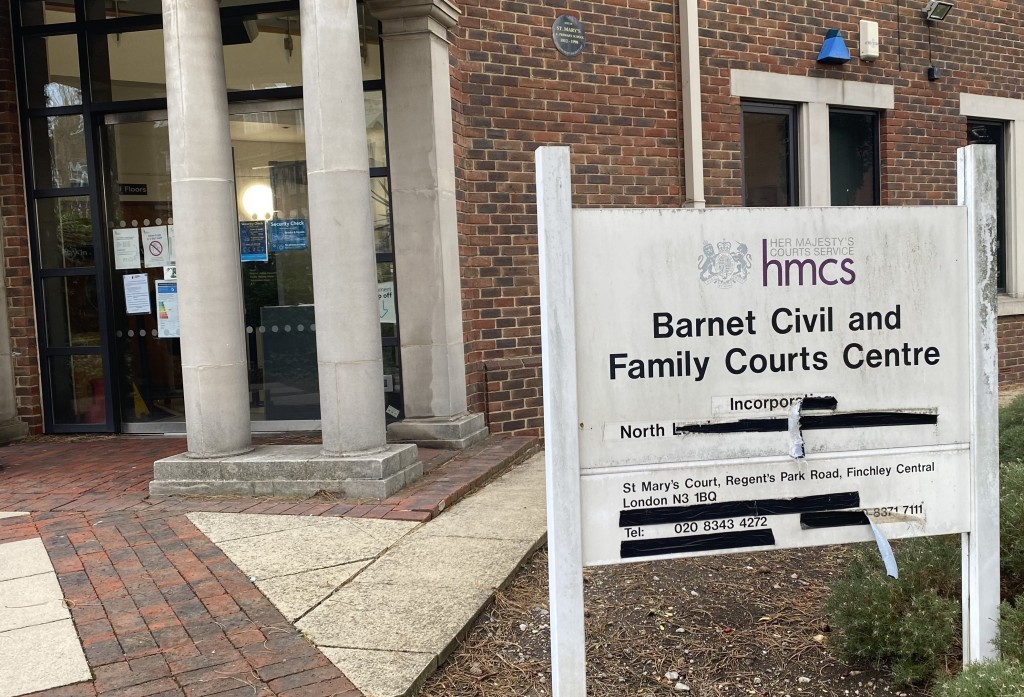A trip to North London in October 2022 to observe the latest development in a series of mortgage fraud hearings almost had to be aborted after court staff denied entry. Some polite but persistent resistance was needed in order to gain access and report on the case.
Part of a series looking at Secret Courts

The sign outside the court was the first red flag. Aside from the filth and the peeling gaffer tape, HMCS hasn’t existed as an organisation since April 2011. It’s still better than the entrance to Snaresbrook Crown Court, once described by counsel as looking “like the entrance to a graveyard that hasn’t been looked after for a while“.
What follows is a series of statements made by court staff. During the course of these conversations I made a written note of what was said which was repeated to them to ensure accuracy.
Upon entering I told the security guard that I was there to watch a case. She replied that “the public are not allowed” to observe hearings.
I could attend the “Crown Court, Magistrates’ but not county court…because they have a public gallery” and “here because they’re civil proceedings you need permission”
This is entirely wrong.
Civil Procedure Rule 39.2(1) states:
The general rule is that a hearing is to be in public.
Civil Procedure Rule 39.2(2A) states:
The court shall take reasonable steps to ensure that all hearings are of an open and public character, save when a hearing is held in private.
As early as 1829 Bayley J, giving the judgment of the Court, said:
… we are all of opinion that it is one of the essential qualities of a court of justice that its proceedings should be public, and that all parties who may be desirous of hearing what is going on, if there be room in the place for that purpose – provided they do not interrupt the proceedings, and provided there is no specific reason why they should be removed – have a right to be present for the purpose of hearing what is going on.
More recently in 2016 Leggatt J, giving the judgment of the court in O’Connor v CPS said:
Access to a court building for the purpose of attending a public hearing is a matter of legal right
I note that this was not a private hearing.
A second security officer, whom I recall was standing behind a desk to my right, then stated that “you can attend but with permission from the judge and with the consent of both parties”.
Again wrong. Consent of the parties is expressly irrelevant.
Civil Procedure Rule 39.2(1) states:
A hearing may not be held in private, irrespective of the parties’ consent, unless and to the extent that the court decides that it must be held in private, applying the provisions of paragraph (3).
In T v Legal Aid Board [1998] EWCA Civ 958:
When both sides agreed that information should be kept from the public that was when the court had to be most vigilant.
I pause to note that at no point did I consider the staff were in any way rude and this very much appeared to be a group opinion rather than the voice of any one person. It would be inappropriate to single any one person out. It would appear to be a systemic failure rather than anything more sinister.
A degree of persistent assertiveness caused the response to develop into one of ‘you can come into the building but you’ll need permission from the judge to attend the hearing’.
Having reported to the ushers desk on the first floor I was told I would be allowed to attend the hearing but I couldn’t make notes unless I made an application to the judge.
Wrong again. Burnett J in Ewing v Crown Court said
the default position as being that those who attend public court hearings should be free to make notes of what occurs. It is a feature of the principle of open justice that those attending public hearings should ordinarily be able to make notes of what occurs.
It’s not known why the default position of court staff is one of secrecy, I doubt it’s anything sinister but it has a chilling effect on members of the public being able to observe the justice system.
I sometimes post these hearings on an internet forum dedicated to crowd funded property investments, sometimes the underlying investors ask me if they can see a case which has some of their hard earned dosh tied up in complex litigation. I tell them these are public hearings but that they should be expected to fight to gain entry and not to take no for an answer. It should not be like this.
So what happened?
Ultimately I was allowed into the hearing without any fanfare or questioning by the Judge. Exactly how it should be.
I contemporaneously tweeted about the experience
And HMCTS replied:
Disappointingly this came after the Bureau of Investigative Journalism had reported about unlawfully being denied access to possession hearings just the year before.
More recently Polly Rippon, a media law/court reporting teacher at Sheffield University, tweeted that her students had been told they couldn’t take notes at a Magistrates’ Court
When even the very basics of open justice haven’t been explained to court staff there can be no surprise that these obstructions crop up. Sadly it’s a systemic issue which makes it more the harder to fix.
The authorities that court proceedings should be open to public scrutiny, are long established. Here are a few examples:
R (Guardian News & Media Ltd) v Westminster Magistrates Court [2013] QB 619 Toulson LJ describes the open justice principle as being:
the heart of our system of justice and vital to the rule of law and that it maintains public confidence in the impartial administration of justice by ensuring that judicial hearings are subject to public scrutiny
Yalland & Ors v Secretary of State for Exiting the European Union [2017] EWHC 629 states:
The requirement that justice should be administered openly and in public is a fundamental tenet of our legal system. The administration of justice must be open to public scrutiny. This principle is inextricably linked with that of freedom of speech and in particular the freedom of the press and other media to report court proceedings
Article 10 of the Human Rights Act states:
Everyone has the right to freedom of expression. This right shall include freedom to hold opinions and to receive and impart information and ideas without interference by public authority and regardless of frontiers
JIH v News Group Newspapers Ltd (Rev 1) [2011] EWCA Civ 42, para 4, states:
…public coverage of court proceedings is a fundamental aspect of freedom of expression…
Home Office v Harman [1983] AC 280, Lord Diplock at p303 states:
…Justice is to be administered in open court where anyone present may listen to and report what was said…

3 thoughts on “Entry Denied at Barnet Civil Justice Centre”